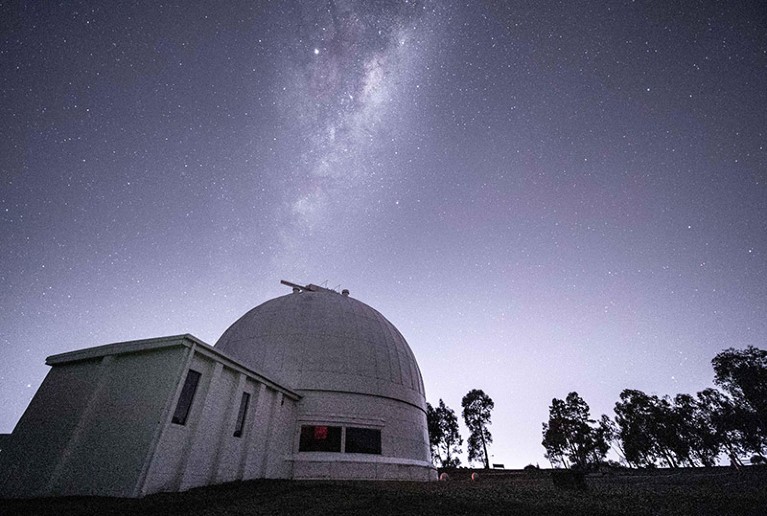Australia’s nascent space sector would be affected if the proposed law change is passed.Credit: Liu Changchang/Xinhua/Alamy
Scientists have reacted with alarm at a proposal by the Australian Department of Defence to control information sharing with foreign researchers, even those working in Australia.
If it is passed, the proposed Defence Trade Controls Amendment Bill 2023 would affect scores of scientists working in Australia and have a chilling effect on international collaboration and the employment of visiting researchers in Australian laboratories, scientists say.
“Because we are in such an interconnected world, it is critical that we continue to exchange knowledge to solve the problems,” says Anna-Maria Arabia, chief executive of the Australian Academy of Science in Canberra.
The act, as it currently stands, requires Australian researchers to obtain a permit to export ‘dual-use’ technologies — technology that could have military uses. Failure to do so could result in fines and up to 10 years in prison. Dual-use technologies are detailed in the Defence and Strategic Goods List, a 344-page document that includes items such as sea-bed sonar mapping technology, spacecraft and protective suits against ‘biological agents’. A review of the act in 2019 recommended restrictions on collaborations not be tightened.
Under the 2023 amendment, Australian researchers working with dual-use technologies would have obtain to a permit to collaborate with foreign citizens, even those in their own research facilities in Australia.
Arabia says that the amendment would affect a huge number of scientists currently working in Australia. “A very large proportion of Australia’s research workforce is international and do not necessarily have citizenship or permanent residency,” she says.
Australian Academy of Science president Chennupati Jagadish says that his research group, which focuses on nanotechnology and semiconductors, consists almost entirely of students, postdoctoral researchers and technicians from other countries. “We will need permits for all what we do,” Jagadish says. “Without them, my collaborations would see me jailed.”

Australia dials back effort to control ‘dual use’ research
The announcement of the proposed amendments, on 7 November, with only a ten-day window for public submissions, caught many off guard. Arabia says that the academy hosted a conference on national security and international research collaborations one week after the amendments were announced but that “the vast majority” of the security specialists and researchers attending were blindsided by the proposal.
The Australian Department of Defence and Australian Minister for Defence Richard Marles did not respond to requests for comment.
AUKUS exemption
The changes would make an exemption for sharing dual-use technology with researchers in the United States or United Kingdom, nations that are partners with Australia in the trilateral AUKUS security pact, announced in September 2021.
However, Alison Barnes, president of the National Tertiary Education Union in Melbourne, Australia, says that the exception adds to her concerns about the bill. She said that it could lead to “preferential treatment” of UK or US scientists and increased discrimination against researchers from other parts of the world.
One sector that would be heavily affected by the amendments is Australia’s nascent space industry. Anntonette Dailey, previously executive director of operations and communications at the Australian Space Agency in Adelaide, Australia, says that the amendments could pose a notable challenge to the sector, given Australia’s relative lack of history in the field. “The vast majority of capability does come from those that have worked overseas,” Dailey says.
Although the exemptions applied to collaborations with the United States and United Kingdom would make collaborations easier for some companies, others could be crippled by the permit requirements, Dailey says.
On top of existing limitations on the export of dual-use technology, the proposed amendments could make it harder for international scientists — including PhD students and postdoctoral researchers — to obtain work in Australian scientific facilities. And it’s unclear how onerous the permit application will be, or the length of time it will take for one to be issued.
Vanessa Teague, a cryptographer at the Australian National University in Canberra, says that because encryption research is listed on the Defence and Strategic Goods List, she has previously had to apply for permits to communicate with overseas research colleagues. “On multiple occasions, although we had applied for permit renewal well in advance, the reissue was delayed so long as to leave a few weeks’ gap, during which we were not permitted to continue normal research communication with overseas colleagues,” Teague says. On another occasion, the permit restricted her to communicating with colleagues in certain countries. She says that the proposed amendments are “large and unjustified” and that she fears the result will be “criminalizing for the first time the transfer of controlled technology within Australia”.
Infectious-diseases researcher Jonathan Iredell, at the University of Sydney, Australia, is concerned that the amendments could put “weird constraints” on activity and communication in his lab, which is examining solutions to weaponized pathogens. “I presume it means that unless you’re an Australian citizen that has been checked out with an appropriate defence clearance, you can’t be part of any conversation” about dual-use technology. “Even inadvertently in a lunch room,” he says.
Following the conclusion of the public submission period, the Australian government will be “consulting with stakeholders” on the bill until early 2024, according to a statement of the Department of Defence website.
